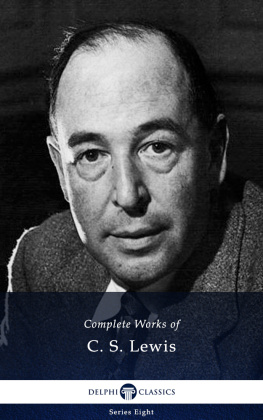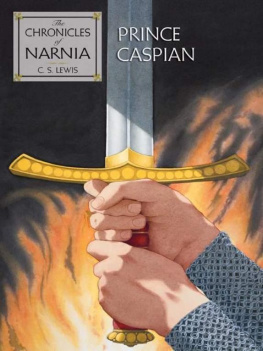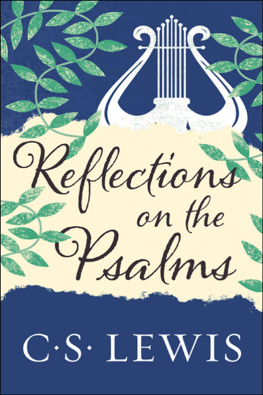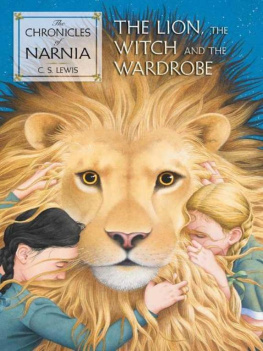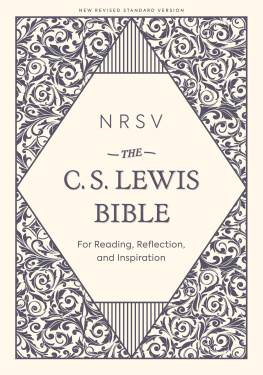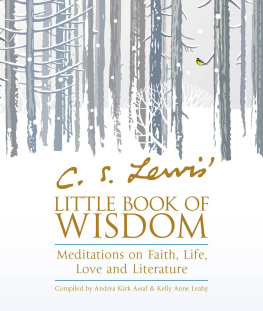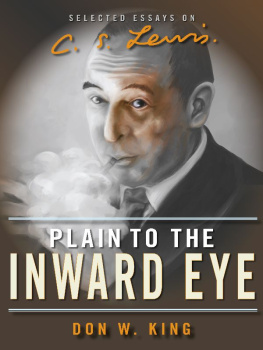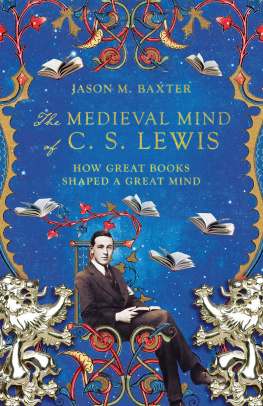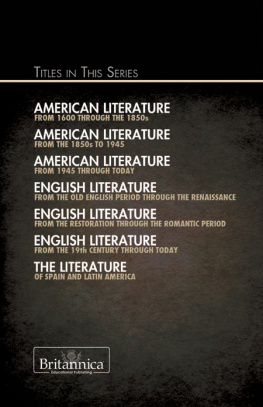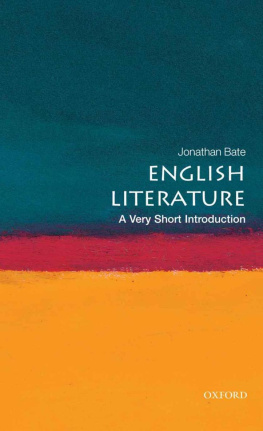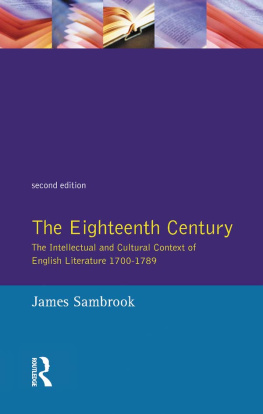When I began this book I had the ideaperhaps most literary historians haveof giving each author space in proportion to the value I set on him; but I found it would not do. Things need to be treated at length not in so far as they are great but in so far as they are complicated. Good books which are remote from modern sympathy need to be treated at greater length than good books which everyone already knows and loves. Bad books may be of importance for the history of taste and if they are passed over too briefly the students picture of a period may be distorted. Finally, if I had worked strictly to scale I should have been forced either to leave out many minor authors altogether (as roads and small rivers could not be made visible in maps unless their width were exaggerated) or else to say more on some great authors not because more needed to be said but for the sake of proportion.
Where I have quoted from neo-Latin authors I have tried to translate them into sixteenth-century English, not simply for the fun of it but to guard the reader from a false impression he might otherwise receive. When passages from Calvin, Scaliger, or Erasmus in modern English jostle passages from vernacular writers with all the flavour of their period about them, it is fatally easy to get the feeling that the Latinists are somehow more enlightened, less remote, less limited by their age, than those who wrote English. It seemed worth some pains to try to remove so serious and so latent a misconception.
It is the rule of this series that the titles of books (with certain exceptions) should be modernized in the text but given exactly in the Bibliography.
I have to thank the Master and Fellows of Trinity College, Cambridge, for allowing me to use this book, in an embryonic state, as the Clark Lectures (1944); Professor F. P. Wilson for such painstaking and skilled help as few authors have ever had from their friends; Mr. Dowling for much help with my Bibliography, and Professor Douglas Bush for submitting to certain petty pilferings from his; Mr. R. E. Alton for guidance through the labyrinth of our Faculty library; Dr. J. A. W. Bennett and Mr. H. V. D. Dyson for advice and criticism; and Miss Joy Davidman for help with the proofs.
C. S. L.
The rough outline of our literary history in the sixteenth century is not very difficult to grasp. At the beginning we find a literature still medieval in form and spirit. In Scotland it shows the highest level of technical brilliance: in England it has for many years been dull, feeble, and incompetent. As the century proceeds, new influences arise: changes in our knowledge of antiquity, new poetry from Italy and France, new theology, new movements in philosophy or science. As these increase, though not necessarily because of them, the Scotch literature is almost completely destroyed. In England the characteristic disease of late medieval poetry, its metrical disorder, is healed: but replaced, for the most part, by a lifeless and laboured regularity to which some ears might prefer the vagaries of Lydgate. There is hardly any sign of a new inspiration. Except for the songs of Wyatt, whose deepest roots are medieval, and the prose of the Prayer Book, which is mostly translation, authors seem to have forgotten the lessons which had been mastered in the Middle Ages and learned little in their stead. Their prose is clumsy, monotonous, garrulous; their verse either astonishingly tame and cold or, if it attempts to rise, the coarsest fustian. In both mediums we come to dread a certain ruthless emphasis; bludgeon-work. Nothing is light, or tender, or fresh. All the authors write like elderly men. The mid-century is an earnest, heavy-handed, commonplace age: a drab age. Then, in the last quarter of the century, the unpredictable happens. With startling suddenness we ascend. Fantasy, conceit, paradox, colour, incantation return. Youth returns. The fine frenzies of ideal love and ideal war are readmitted. Sidney, Spenser, Shakespeare, Hookereven, in a way, Lylydisplay what is almost a new culture: that culture which was to last through most of the seventeenth century and to enrich the very meanings of the words England and Aristocracy. Nothing in the earlier history of our period would have enabled the sharpest observer to foresee this transformation.
Some have believed, or assumed, that it resulted from what seemed at the time to be a resurrection, rejuvenescence, or renascentiathe recovery of Greek and the substitution of Augustan for medieval Latin. It is, of course, true that the rich vernacular literature of the eighties used the fruits of that event, as it used the Middle Ages and everything else it could lay its hands on. It is also true that many movements of thought which affected our literature would have been impossible without the recovery of Greek. But if there is any closer connexion than that between the renascentia and the late sixteenth-century efflorescence of English literature, I must confess that it has escaped me. The more we look into the question, the harder we shall find it to believe that humanism had any power of encouraging, or any wish to encourage, the literature that actually arose. And it may be as well to confess immediately that I have no alternative explanation to offer. I do not claim to know why there were many men of genius at that time. The Elizabethans themselves would have attributed it to Constellation. I must be content with trying to sketch some of the intellectual and imaginative conditions under which they wrote.
It comes naturally to a modern to suppose that the new astronomy made a profound impression on mens minds; but when we look into the literary texts we find it rarely mentioned. The idea that it produced a shock comparable to that which Darwin gave to the Victorians or Freud to our own age is certainly mistaken. Nor are the reasons hard to find. In the first place it must be remembered that the De Revolutionibus (1543) of Copernicus put forward only a theory: verification, at the hands of Kepler and Galileo, came only at the end of our period, and general acceptance later still. And secondly, humanism, dominant in mid-sixteenth-century England, tended to be on the whole indifferent, if not hostile, to science. It is an English humanist, a classical pedant, who in Brunos Cena delle Cenere (1584) still thinks that Copernicus can be dismissed with an airy gibe from the Adagia of Erasmus. Even where the new theory was accepted, the change which it produced was not of such emotional or imaginative importance as is sometimes supposed. For ages men had believed the earth to be a sphere. For ages, as we see in Vincent of Beauvais or Dante or John Mandeville, men had realized that movement towards the centre of the earth from whatever direction was downward movement. For ages men had known, and poets had emphasized, the truth that earth, in relation to the universe, is infinitesimally small: to be treated, said Ptolemy, as a mathematical point (Almagest, I. V). Nor was it generally felt that earth, or Man, would lose dignity by being shifted from the cosmic centre. The central position had not implied pre-eminence. On the contrary, it had implied, as Montaigne says (Essais, II, xii), the worst and deadest part of the universe, the lowest story of the house, the point at which all the light, heat, and movement descending from the nobler spheres finally died out into darkness, coldness, and passivity. The position which was locally central was dynamically marginal: the rim of being, farthest from the hub. Hence, when any excitement was shown at the new theory, it might be exhilaration. The divine Cusanus (140164), who was an early believer (for his own, metaphysical, reasons) in earths movement, rejoiced in 1440 to find that she also is a noble star with her own light, heat, and influence (


